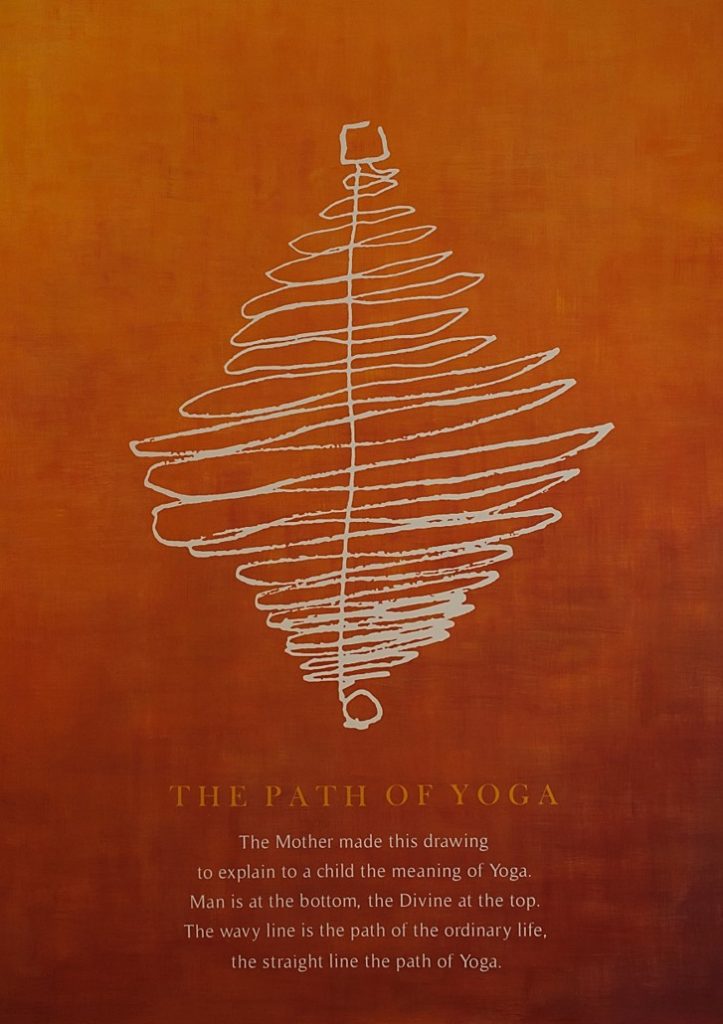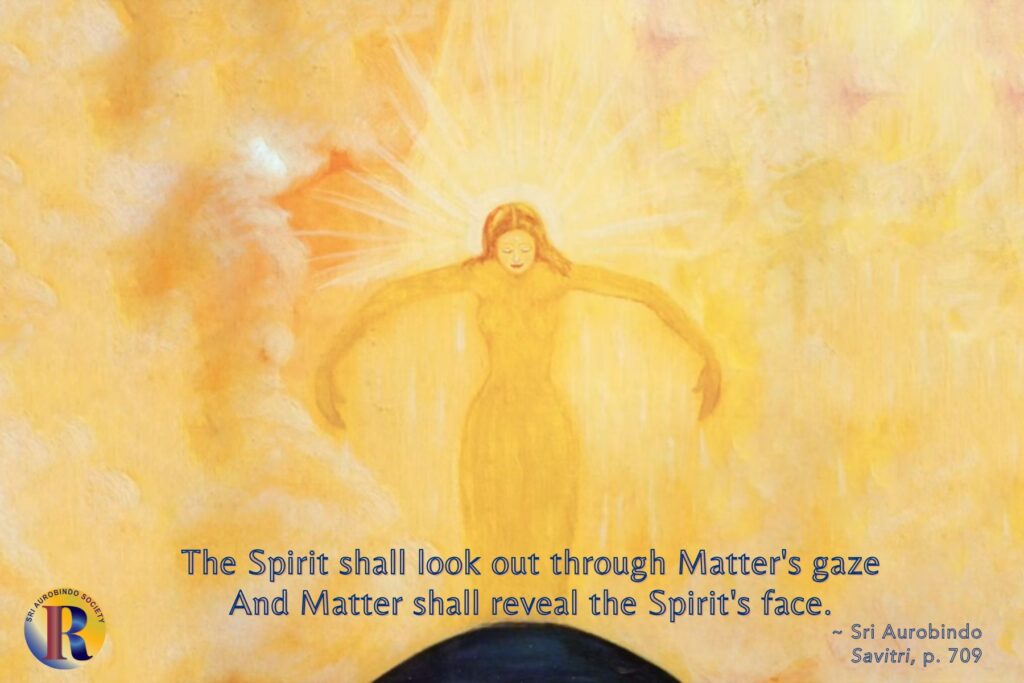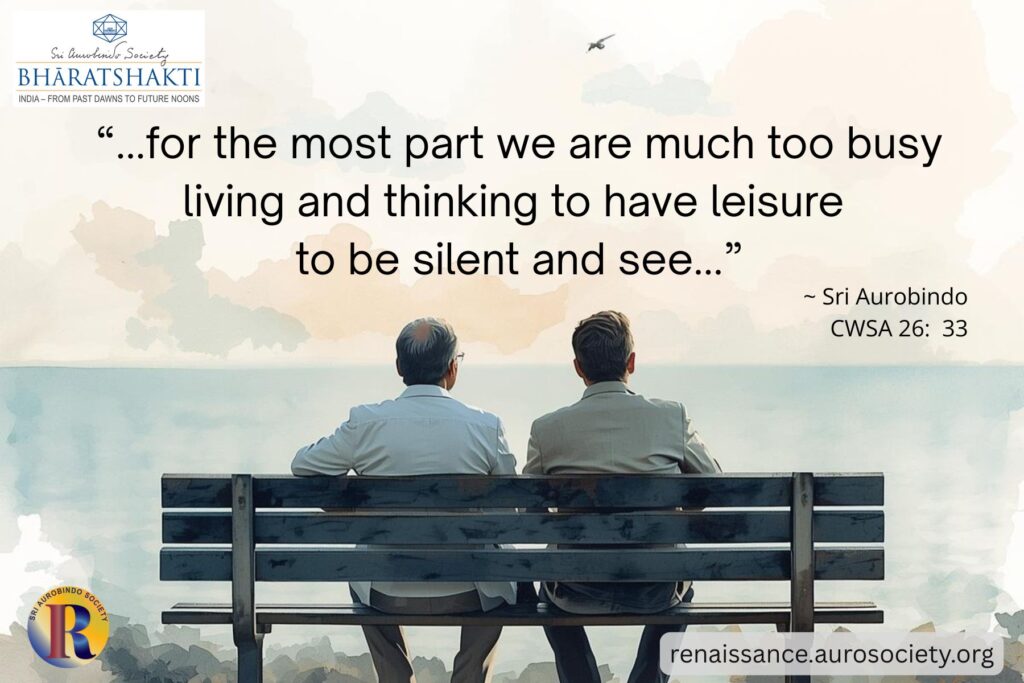Volume 1, Issue 4
Author: Sri Aurobindo and the Mother
Editor’s Note: We present here some insights from Sri Aurobindo and the Mother on deeper meaning and aim of Yoga, a methodised effort towards self-perfection by the expression of the secret potentialities latent in the being.

What is Yoga?
“Yoga is a means by which one arrives at union with the Truth behind things through an inner discipline which leads us from the consciousness of the outward and apparent to the consciousness of the inner and real. Yoga consciousness does not exclude the knowledge of the outer apparent world but it sees it with the eyes of an inner, not an outer seeing and experience, alters and sets right all its values in the light of an inner deeper greater truer consciousness and applies to it the Law of the reality, exchanging the law of the creature’s Ignorance for the rule of a divine Will and Knowledge.
“A change of consciousness is the whole meaning of the process of Yoga.”
~ Sri Aurobindo, CWSA, Vol. 12, p. 327
***
“In the right view both of life and of Yoga all life is either consciously or subconsciously a Yoga. For we mean by this term a methodised effort towards self-perfection by the expression of the secret potentialities latent in the being and – highest condition of victory in that effort – a union of the human individual with the universal and transcendent Existence we see partially expressed in man and in the Cosmos.
“But all life, when we look behind its appearances, is a vast Yoga of Nature who attempts in the conscious and the subconscious to realise her perfection in an ever-increasing expression of her yet unrealised potentialities and to unite herself with her own divine reality.”
~ Sri Aurobindo, CWSA, Vol. 23, pp. 6-7
***
“Yoga is the science, the process, the effort and action by which man attempts to pass out of the limits of his ordinary mental consciousness into a greater spiritual consciousness.”
~ Sri Aurobindo, CWSA, Vol. 12, p. 327
***
Yoga is not New
“Yoga is not a modern invention of the human mind, but our ancient and prehistoric possession. The Veda is our oldest extant human document and the Veda, from one point of view, is a great compilation of practical hints about Yoga. All religion is a flower of which Yoga is the root; all philosophy, poetry & the works of genius use it, consciously or unconsciously, as an instrument.
We believe that God created the world by Yoga and by Yoga He will draw it into Himself again. Yogah prabhavapyayau, Yoga is the birth and passing away of things. When Sri Krishna reveals to Arjuna the greatness of His creation and the manner in which He has built it out of His being by a reconciliation of logical opposites, he says “Pasya me yogam aishwaram”, Behold my divine Yoga.”
~ Sri Aurobindo, CWSA, Vol. 12, pp. 18-19
***
“All Yoga is in its nature an attempt and an arriving at unity with the Supreme,—unity with the being of the Supreme, unity with the consciousness of the Supreme, unity with the bliss of the Supreme,—or, if we repudiate the idea of absolute unity, at least at some kind of union, even if it be only for the soul to live in one status and periphery of being with the Divine, salokya, or in a sort of indivisible proximity, samīpya. This can only be gained by rising to a higher level and intensity of consciousness than our ordinary mentality possesses.”
~ Sri Aurobindo, CWSA Vol. 23, p. 528
Also read: India for Yoga, Yoga for India
***
Yoga is Not Religion
“All religion begins with the conception of some Power or existence greater and higher than our limited and mortal selves, a thought and act of worship done to that Power, and an obedience offered to its will, its laws or its demands. But Religion, in its beginnings, sets an immeasurable gulf between the Power thus conceived, worshipped and obeyed and the worshipper.
“Yoga in its culmination abolishes the gulf; for Yoga is union.
“We arrive at union with it through knowledge; for as our first obscure conceptions of it clarify, enlarge, deepen, we come to recognise it as our own highest self, the origin and sustainer of our being and that towards which it tends. We arrive at union with it through works; for from simply obeying we come to identify our will with its Will, since only in proportion as it is identified with this Power that is its source and ideal, can our will become perfect and divine.
“We arrive at union with it also by worship; for the thought and act of a distant worship develops into the necessity of close adoration and this into the intimacy of love, and the consummation of love is union with the Beloved.”
~ Sri Aurobindo, CWSA, Vol. 24, p. 552
***
Yoga is Not Merely an Exercise Regimen
“We usually attach a more limited sense to the word; when we use or hear it, we think of the details of Patanjali’s system, of rhythmic breathing, of peculiar ways of sitting, of concentration of mind, of the trance of the adept. But these are merely details of particular systems. The systems are not the thing itself, any more than the water of an irrigation canal is the river Ganges.
“Yoga may be done without the least thought for the breathing, in any posture or no posture, without any insistence on concentration, in the full waking condition, while walking, working, eating, drinking, talking with others, in any occupation, in sleep, in dream, in states of unconsciousness, semi- consciousness, double-consciousness. It is no nostrum or system or fixed practice, but an eternal fact of process based on the very nature of the Universe. Nevertheless, in practice the name may be limited to certain applications of this general process for specific and definite ends.
“Yoga stands essentially on the fact that in this world we are everywhere one, yet divided; one yet divided in our being, one with yet divided from our fellow creatures of all kinds, one with yet divided from the infinite existence which we call God, Nature or Brahman.
“Yoga, generally, is the power which the soul in one body has of entering into effective relation with other souls, with parts of itself which are behind the waking consciousness, with forces of Nature and objects in Nature, with the Supreme Intelligence, Power & Bliss which governs the world either for the sake of that union in itself or for the purpose of increasing or modifying our manifest being, knowledge, faculty, force or delight. Any system which organises our inner being & our outer frame for these ends may be called a system of Yoga.”
~ Sri Aurobindo, CWSA, Vol. 12, pp. 18-19
***
Yoga and Evolution
“Yoga is the contact of the humanity in us with the deity in which it dwells, of the finite with the Infinite, of the as yet accomplished evolving & imperfect humanity with its yet unevolved attainable perfection, of the outwardly active waking consciousness which is controlled with the inwardly active controlling consciousness, of man with God, of the changing outward apparent ego with the secret real and immutable Self.
“By that contact the lower rises to the higher, the unevolved evolves, the unborn is created, humanity assumes some part of godhead, man moves upward to God. This upward and self-expanding movement is the utility of Yoga.”
~ Sri Aurobindo, CWSA, Vol. 12, p. 333
***
“Yoga, as Swami Vivekananda has said, may be regarded as a means of compressing one’s evolution into a single life or a few years or even a few months of bodily existence.
“A given system of Yoga, then, can be no more than a selection or a compression, into narrower but more energetic forms of intensity, of the general methods which are already being used loosely, largely, in a leisurely movement, with a profuser apparent waste of material and energy but with a more complete combination by the great Mother in her vast upward labour…
“… Yogic methods have something of the same relation to the customary psychological workings of man as has the scientific handling of the force of electricity or of steam to their normal operations in Nature. And they, too, like the operations of Science, are formed upon a knowledge developed and confirmed by regular experiment, practical analysis and constant result.
“All Rajayoga, for instance, depends on this perception and experience that our inner elements, combinations, functions, forces, can be separated or dissolved, can be new-combined and set to novel and formerly impossible workings or can be transformed and resolved into a new general synthesis by fixed internal processes.
“Hathayoga similarly depends on this perception and experience that the vital forces and functions to which our life is normally subjected and whose ordinary operations seem set and indispensable, can be mastered and the operations changed or suspended with results that would otherwise be impossible and that seem miraculous to those who have not seized the rationale of their process.
“And if in some other of its forms this character of Yoga is less apparent, because they are more intuitive and less mechanical, nearer, like the Yoga of Devotion, to a supernal ecstasy or, like the Yoga of Knowledge, to a supernal infinity of consciousness and being, yet they too start from the use of some principal faculty in us by ways and for ends not contemplated in its everyday spontaneous workings.
“All methods grouped under the common name of Yoga are special psychological processes founded on a fixed truth of Nature and developing, out of normal functions, powers and results which were always latent but which her ordinary movements do not easily or do not often manifest.”
~ Sri Aurobindo, CWSA, Vol. 23, pp. 6-7
***
Ultimate Aim of All Yoga
“All Yoga strives towards union with the Highest, the Spirit, the Self, the Divine, or whatever other name or aspect we seize of the One Eternal and Infinite.
“And by union we mean, first, contact constant and increasing with the consciousness of the Divine or Infinite, then to assimilate it or assimilate ourselves to it, then to become not only like to it and full of it, but to enter into it and dwell in it, to become that divine consciousness and being, essence of its essence and so abolish all division that separates us from the Divinity from whom we came.”
~ Sri Aurobindo, CWSA, Vol. 12, p. 332
***
“What do you want the Yoga for?
“To get power? To attain to peace and calm? To serve humanity? None of these motives is sufficient to show that you are meant for the Path.
“The question you are to answer is this: Do you want the Yoga for the sake of the Divine? Is the Divine the supreme fact of your life, so much so that it is simply impossible for you to do without it? Do you feel that your very raison d’être is the Divine and without it there is no meaning in your existence? If so, then only can it be said that you have a call for the Path.
“This is the first thing necessary—aspiration for the Divine.”
~ The Mother, CWM, Vol. 3. p. 1

***
Dangers of Yoga?
“Everything depends upon the spirit with which you approach it. Yoga does become dangerous if you want it for your own sake, to serve a personal end. It is not dangerous, on the contrary, it is safety and security itself, if you go to it with a sense of its sacredness, always remembering that the aim is to find the Divine. Dangers and difficulties come in when people take up Yoga not for the sake of the Divine, but because they want to icquire power and under the guise of Yoga seek to satisfy some ambition. If you cannot get rid of ambition, do not touch the thing. It is fire that burns.
~ The Mother, CWM, Vol. 3, p. 4
The Mother gave additional explanations in these words:
“It is said that Yoga is the “final goal of life”, but what do you expect from this final goal? Some say it means to know oneself; that is the personal and individual aspect. If it is pushed a little farther it means to be conscious of the truth of one’s being: why are you born and what should you do?
“And if it is pushed still farther, you may become conscious of your relations with other human beings; and a little farther yet, you may ask what is the role, the aim of humanity in the world? And yet again, what is the condition of the earth from the psychological standpoint? What is the universe, what is its goal, its role? In this way, you move from stage to stage and finally you see the problem in its totality.
“You must see the thing, the experience behind the words. Here we speak of Yoga but elsewhere one would speak differently; some would say, “I am seeking my raison d’être”, and so on. Those who have a religious bent will say, “I want to find the divine Presence.” There are fifty ways of saying the thing but it is the thing which is important; you must feel it in your head, in your heart, everywhere. It must be concrete, living, otherwise you cannot advance. You must come out of words and get into action—get into the experience, get into life. …..
“There are countries and people who know vaguely that there is something called yoga, and they begin it with the idea that they will become superior to others, will get a greater power than others and consequently will be able to dominate others—this is the worst reason, the most selfish, that which brings the most harmful consequences.
“Others who are greatly troubled, who have a very difficult life, who have worries, sorrows, many cares, say, “Oh, I shall find something that will give me peace, tranquillity, and I shall be able to get a little rest.” And they rush into Yoga thinking they are going to be quite happy and satisfied. Unfortunately, it is not altogether like that. When you begin the Yoga for reasons of this kind, you are sure to meet great difficulties on the way.
“And then there is this great virtue in men’s eyes: “philanthropy”, “love of humanity”; so many people say, “I am going to do Yoga to be able to serve humanity, make the unhappy happy, organise the world in the happiest way for everybody.” I say this is not sufficient—I do not say that this is bad in itself, although I have heard an old occultist say wittily: “It won’t be so very soon that there will be no more misery in the world, because there are too many people who are happy to live on this misery.”
“It was a witticism but it is not altogether wrong. If there were no misery to soothe, the philanthropist would no longer have any reason for his existence —he is so satisfied with himself, he has so strong an impression that he is not selfish!”
~ The Mother, CWM, Vol. 4, pp. 64-67



